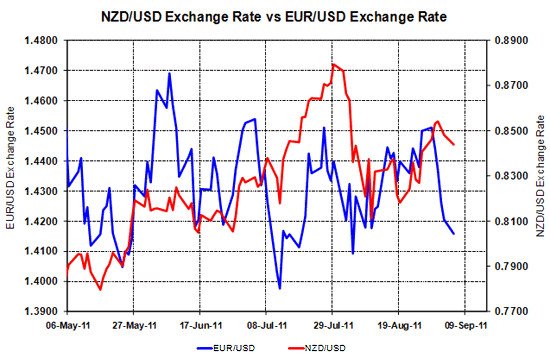
 By Roger J Kerr
By Roger J Kerr
The big difference between this week and last week in the foreign exchange markets is that the EUR/USD rate after taking a peek at $1.4500 last week now trades at $1.4150.
FX market positioning and sentiment has reversed as global investors move on from the US debt debacle and realise that Europe has considerably more economic and debt problems than the US.
The direction of the EUR/USD rate is also driven by expectations of whether the US Federal Reserve will print more USD’s under a QE3 monetary loosening, or not.
Further monetary easing by the Federal Reserve is negative for the USD value; however the USD gains from $1.4500 to $1.4150 late last week suggest that the markets are now not so sure that Ben Bernanke will deliver this in a few weeks time.
As a consequence of the USD reversal of direction against the Euro, the NZD and AUD are both tracking lower.
Weaker global equity markets seem likely over the near term following the weak US jobs numbers on Friday; therefore the risk-off button for international investors should see the antipodean currencies lower this week. A decisive break below the support level at $1.4000 for the EUR/USD rate may well see technically driven buying of the USD and thus cause the Kiwi to break below its 0.8000 support area.
The NZD/USD exchange rate still remains somewhat elevated vis-a-vis the EUR/USD following the flood of funds that parked into the Kiwi ahead of the US debt ceiling ultimatum in early August. There needs to be some surprise negative news for the Kiwi to force a catch up on the lower EUR/USD rate. That negative news could well be a more dovish than expected RBNZ monetary policy statement on 15 September.
The EUR/USD direction is however not just about the US economy and the probability of QE3 happening.
The increase in official European interest rates back in March by the ECB could well be reversed over coming months as inflation threats diminish and the powerhouse of European economic fortunes, the German economy suffers weaker numbers. Add on the Italian and Greek sovereign debt problems and there are not too many reasons to buy the Euro and plenty of reasons to sell it. The parliamentary vote in Germany later in the month on the Greek bailout package could be telling for the Euro exchange rate value.
The local currency markets will be focussed on a stack of Australian economic data this week with a RBA interest rate review tomorrow, GDP growth on Wednesday, a speech by RBA Governor Stevens also on Wednesday and employment data on Thursday. More confirmation of the high AUD value slowing the Australian economy will enhance the current pricing of lower interest rates by their moneymarkets. Lower commodity prices from here off the back of lower global GDP growth forecasts should also weigh the AUD down.

No chart with that title exists.
--------------------
* Roger J Kerr runs Asia Pacific Risk Management. He specialises in fixed interest securities and is a commentator on economics and markets. More commentary and useful information on fixed interest investing can be found at rogeradvice.com
1 Comments
Gold over US 1'900 oz - Euro/ US$ - banks struggling - http://www.indexmundi.com/agriculture/?commodity=powdered-whole-milk&graph=production - NZpositive
Why should the NZ$ drop ??

We welcome your comments below. If you are not already registered, please register to comment
Remember we welcome robust, respectful and insightful debate. We don't welcome abusive or defamatory comments and will de-register those repeatedly making such comments. Our current comment policy is here.